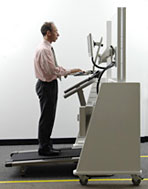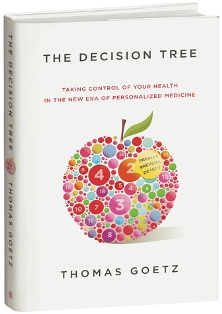
September 20th, 2010 by JenniferKearneyStrouse in Better Health Network, Health Policy, Health Tips, News, Quackery Exposed
Tags: ACP Internist, Adrenal Fatigue, Dangerous Side Effects, Endocrine Society, Fake Diseases, Faux Medical Conditions on the Internet, General Medicine, Hormone Foundation, LA Times, Public Safety, Wilson's Temperature Syndrome
No Comments »

Ever heard of adrenal fatigue? Wilson’s temperature syndrome? If not, there’s a good reason: They exist only on the Internet.
The Hormone Foundation, an affiliate of the Endocrine Society, recently issued two fact sheets for patients debunking these so-called conditions, which were “apparently conceived only in an effort to sell products promoted to treat them,” the LA Times reported. No medical evidence supports either faux disease and there are no tests or treatments for them, but patients still try to alleviate them with supplements, some of them potentially dangerous, the Times said.
Adrenal fatigue is characterized by such “symptoms” as having salt and sugar cravings and needing coffee to get you through the day, while the man who discovered Wilson’s temperature syndrome also coincidentally promotes a product to treat it, according to the Times. (Hormone Foundation, LA Times)

*This blog post was originally published at ACP Internist*
September 19th, 2010 by Maria Gifford in Better Health Network, Expert Interviews, Health Tips, Research
Tags: #txfm2010, Body Weight, Diet and Exercise, Diet and Nutrition, Dr. Jim Levine, Food and Nutrition, Human Energy Requirements, Human Nutrition, Maintain weight, Maria Gifford, Mayo Clinic Transform 2010, Metabolism, Muve, NEAT, Non-Exercise Activity Thermogenesis, Nutrition and Health, Obesity, Physical Activity, Physiology, Treadmill Desk, Trek Desk, Undernutrition, Walk At Work, Walkstation, Weight Control, Weight Management
No Comments »
 Obesity doesn’t stand a chance against Dr. Jim Levine, one of the prestigious presenters at Mayo Clinic’s Transform 2010 conference last week. Dr. Levine’s fascinating research focuses on helping people understand obesity, weight reduction, and Non-Exercise Activity Thermogenesis (NEAT) — the idea that expending calories through the activities of daily living is more important for calorie burning than exercise is.
Obesity doesn’t stand a chance against Dr. Jim Levine, one of the prestigious presenters at Mayo Clinic’s Transform 2010 conference last week. Dr. Levine’s fascinating research focuses on helping people understand obesity, weight reduction, and Non-Exercise Activity Thermogenesis (NEAT) — the idea that expending calories through the activities of daily living is more important for calorie burning than exercise is.
Dr. Levine’s “Treadmill Desk” has won more than 50 national and international awards in science, including the Judson Daland prize from the American Philosophical Society, the Invention of the Future Award from NASA, and the Innovation Award at the World Fair. The “Walkstation” is now a product of Steelcase.
Dr. Levine’s work has been highlighted nationally around the world, and he has produced documentary films with the BBC, ABC, and CNN. His Walkstation has been featured in The New York Times, his vision of a future where office people walk at work in USA Today, and his Treadmill Desk tested live on Good Morning America. Read more »
September 17th, 2010 by DavedeBronkart in Better Health Network, Health Tips, News, Opinion
Tags: A Good Doctor, e-Patients.net, ePatient Dave, Family Medicine, Female Doctor, General Medicine, Internal Medicine, Medical Credentials, National Public Radio, NPR, Picking A Better Doctor, Primary Care, Scott Hensley, U.S. Medical Residencies, U.S. Medical Schools, What Makes A Slightly Better Doctor
No Comments »

On Monday, NPR’s Scott Hensley posted:
“Between the Internet and all the data insurance companies and the government collect on doctors, you’d think it would be a lot easier than it used to be to find a good one. But it’s not.”
Sound familiar around here? See his thoughts: “3 Tips For Picking A Slightly Better Doctor.”
(Thanks to friend Cindy Johnson for the tip.)
*This blog post was originally published at e-Patients.net*
September 16th, 2010 by Maria Gifford in Better Health Network, Health Tips, Interviews, News, True Stories
Tags: #txfm2010, Health and Technology, Maria Gifford, Mayo Clinic Transform 2010, Medicine and New Technology, Personalized Medicine, The Decision Tree, Thomas Goetz, Wired Magazine
No Comments »
 As an invited media guest at Mayo Clinic’s Transform 2010 symposium earlier this week, I had the pleasure of interviewing presenter Thomas Goetz, Executive Editor of Wired Magazine and author of the new book, The Decision Tree: Taking Control of Your Health in the New Era of Personalized Medicine.
As an invited media guest at Mayo Clinic’s Transform 2010 symposium earlier this week, I had the pleasure of interviewing presenter Thomas Goetz, Executive Editor of Wired Magazine and author of the new book, The Decision Tree: Taking Control of Your Health in the New Era of Personalized Medicine.
Thomas writes about science, health, and medicine and believes that engaging people in their health and involving them as participants and decision makers leads to improving their behavior and their health outcomes. He knows there’s a technology emergence of cheaper, better tools that have the ability to offer people a way “in” — from self-tracking gadgets to online disease communities and beyond. Thomas is intrigued by the confluence of ideas and technology that make it an opportune time in healthcare.
 The Decision Tree is based on the premise that our health doesn’t happen all at once, but that it’s a consequence of years of choices — some large, some small, some wise, some poor. A decision tree, therefore, is a “device” that can help make it more obvious that these decisions are something we are actually choosing — a way to externalize the choices that we otherwise make without much thought.
The Decision Tree is based on the premise that our health doesn’t happen all at once, but that it’s a consequence of years of choices — some large, some small, some wise, some poor. A decision tree, therefore, is a “device” that can help make it more obvious that these decisions are something we are actually choosing — a way to externalize the choices that we otherwise make without much thought.
Maria: As executive editor of Wired Magazine, what brought you to write a book about consumer health?
Thomas: I come from a family of healthcare providers — my father is a doctor, my mother is a nurse — so it’s always been a topic area I’ve been comfortable with. A few years ago I felt that I had more to add, and wanted to get more specific in my training, so I got my masters in public health at UC Berkeley. That led me to recognize all sorts of commonalities between the worlds of information technology and public health. At the same time, technologists in Silicon Valley and elsewhere have recognized that healthcare is one of the last industries untouched, in many senses, by the IT revolution. It’s happening now, very quickly, and I wanted to be among the first to not only cover the business, but to cover the way these companies and services will change and improve our lives. Read more »
September 14th, 2010 by Shantanu Nundy, M.D. in Better Health Network, Health Tips, Opinion, Research
Tags: Archives of Internal Medicine, Diabetes, Dietetics, Food and Nutrition, Food Labels, Food Science, Food-Based Approach To Eating, Gary Taubes, General Medicine, Good Calories Bad Calories, Heart Disease, In Defense Of Food, JAMA, Journal of the American Medical Association, Michael Pollan, Nutrient-Based Approach To Food, Nutritional Facts, Obesity, The Science Of Nutrition
No Comments »

The science of nutrition is changing and not in the way you might expect. After years of “reductionist” thinking — where food has been viewed as the sum of its parts -– a call to treat food as food has been sounded. No more poring over nutrition labels to calculate grams of fat or chasing down the latest go-to chemical –- be it vitamin E, fish oil or omega-3. Instead we are being asked to call a potato a potato and a piece of steak — well, a piece of steak.
If you haven’t heard about this sea change yet, you are not alone. The food science industry that markets “food products” for our consumption has done a good job giving their laboratory creations a semblance of health with phrases like “low fat” and “high in vitamin C.” For our part, the medical community is also to blame. Despite evidence to the contrary, we have been slow to renounce the “fat is bad” mantra or break away from the nutrient-based approach to eating that first swept the country over 30 years ago. Read more »
*This blog post was originally published at BeyondApples.Org*




 Obesity doesn’t stand a chance against Dr. Jim Levine, one of the prestigious presenters at Mayo Clinic’s
Obesity doesn’t stand a chance against Dr. Jim Levine, one of the prestigious presenters at Mayo Clinic’s 
 As an invited media guest at Mayo Clinic’s
As an invited media guest at Mayo Clinic’s  The Decision Tree is based on the premise that our health doesn’t happen all at once, but that it’s a consequence of years of choices — some large, some small, some wise, some poor. A decision tree, therefore, is a “device” that can help make it more obvious that these decisions are something we are actually choosing — a way to externalize the choices that we otherwise make without much thought.
The Decision Tree is based on the premise that our health doesn’t happen all at once, but that it’s a consequence of years of choices — some large, some small, some wise, some poor. A decision tree, therefore, is a “device” that can help make it more obvious that these decisions are something we are actually choosing — a way to externalize the choices that we otherwise make without much thought. 








